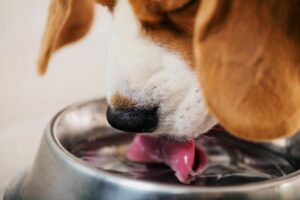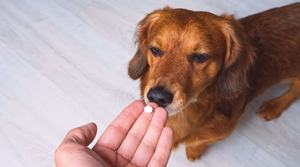
Reviewed & Fact-Checked by
Dr. Paula Simons
Veterinarian (DVM)
Learn more about our Veterinary Review Board »
Zinc is a common trace metal that is important for many body processes.
It is also found in all kinds of household items and occurs naturally in many foods and beverages. The body needs a certain amount of zinc to maintain a healthy immune system and good thyroid function.
For household pets, however, consuming too much zinc can be dangerous, leading to zinc poisoning in dogs.
What is Zinc Poisoning?
Zinc toxicosis occurs when the levels of zinc in a dog's body reach a toxic level secondary to zinc exposure. When toxicity occurs it can have serious and sometimes very swift consequences.
If not treated quickly, zinc poisoning in dogs can lead to anemia, seizures, kidney failure, liver damage, and, potentially death.
How Do Dogs Get Zinc Poisoning?
Most cases of zinc poisoning in dogs are accidental but many are preventable.
This is because almost all cases of zinc toxicity in dogs occur because pups eat something in the home or while out walking.
The most common 'culprits' include all the following:
- Nuts, bolts, small screws, watch batteries, and other zinc containing pieces of metal.
- Lincoln Pennies. All Lincoln pennies minted in the US since 1982 contain 97.5% zinc
- Diaper rash cream
- Sunscreen that contains zinc oxide
- Skincare creams that contain zinc oxide
- Zinc cold lozenges or cough syrups
Does My Dog Have Zinc Poisoning?
The clinical signs of zinc toxicity in dogs can be hard to pinpoint.
They are similar to other gastric illnesses, and they may not appear until several hours, or even a day after a dog has consumed a zinc containing item.
Common signs of zinc toxicosis include the following:
Take Note
If your pet has swallowed anything containing metal (objects or creams), call your veterinarian or Pet Poison Helpline (800-213-6680) immediately! Even one penny can be deadly.
As we mentioned, these clinical signs can often be mistaken for something else.
Zinc poisoning can be severe, and even fatal, it is always better to err on the side of caution and head to the veterinarian if you suspect your pup may have consumed any dangerous zinc item, even if he seems fine.
How is Zinc Toxicity Diagnosed?
When you take your dog to see the veterinarian, it's important you tell them that you are concerned for zinc ingestion.
To diagnose zinc toxicity a veterinarian will perform a full physical exam, looking for visible signs of possible zinc poisoning like dehydration, abdominal tenderness, and pale mucous membranes.
While doing this they will order blood work and a urinalysis to determine the levels of zinc in your pup's body as well assess for signs of red blood cell loss - that will lead to anemia - and any damage to kidney or liver function.
If your dog has consumed a metal object - one of the most common causes of zinc poisoning - your veterinarian will also order an x-ray to determine where in the digestive system the foreign object is currently located.
How is Zinc Poisoning in Dogs Treated?
The faster a pup is treated for zinc poisoning, the better. The initial focus will usually be on getting as much zinc out of your pup's system as possible.
This may be done by inducing vomiting for decontamination. If a metal object is involved, often removal can be attempted via endoscope or even surgery.
In addition to these initial treatments, your dog may need to be treated for secondary effects, including jaundice, anemia, liver or kidney damage. This may involve blood transfusions, IV fluids, medications, antiemetics, or other special treatments.
In some cases, your dog may be sent home within hours. In more severe cases, dogs will be hospitalized for several days.
Recovery from, and Prevention of, Zinc Toxicosis in Dogs
How well, and how quickly, a pup recovers from zinc poisoning will depend both on the severity and how quickly they were treated.
If, for example, he swallowed a penny and it was promptly removed, the chances for a full recovery are very good.
If the zinc consumption went unnoticed, which can happen, the prognosis may be guarded as they may have suffered organ damage that will complicate recovery.
The best thing you can do to prevent zinc poisoning is to be vigilant. Try to keep all loose metal objects especially pennies, off the floor and away from your pup.
In the case of diaper creams and zinc oxide sunscreens, a few licks may only cause a mild stomach ache but larger quantities can be far more harmful, so these things should be kept well away from your dogs too.
However, as we mentioned, accidents do happen. The best thing you can do for your dog, if you think he may have ingested zinc is to call Pet Poison Hotline (800-213-6680). Then get your dog to a veterinarian as soon as possible.
Even if it turns out they have not ingested zinc (maybe that penny rolled under the couch instead) it is always better to be safe than sorry.



